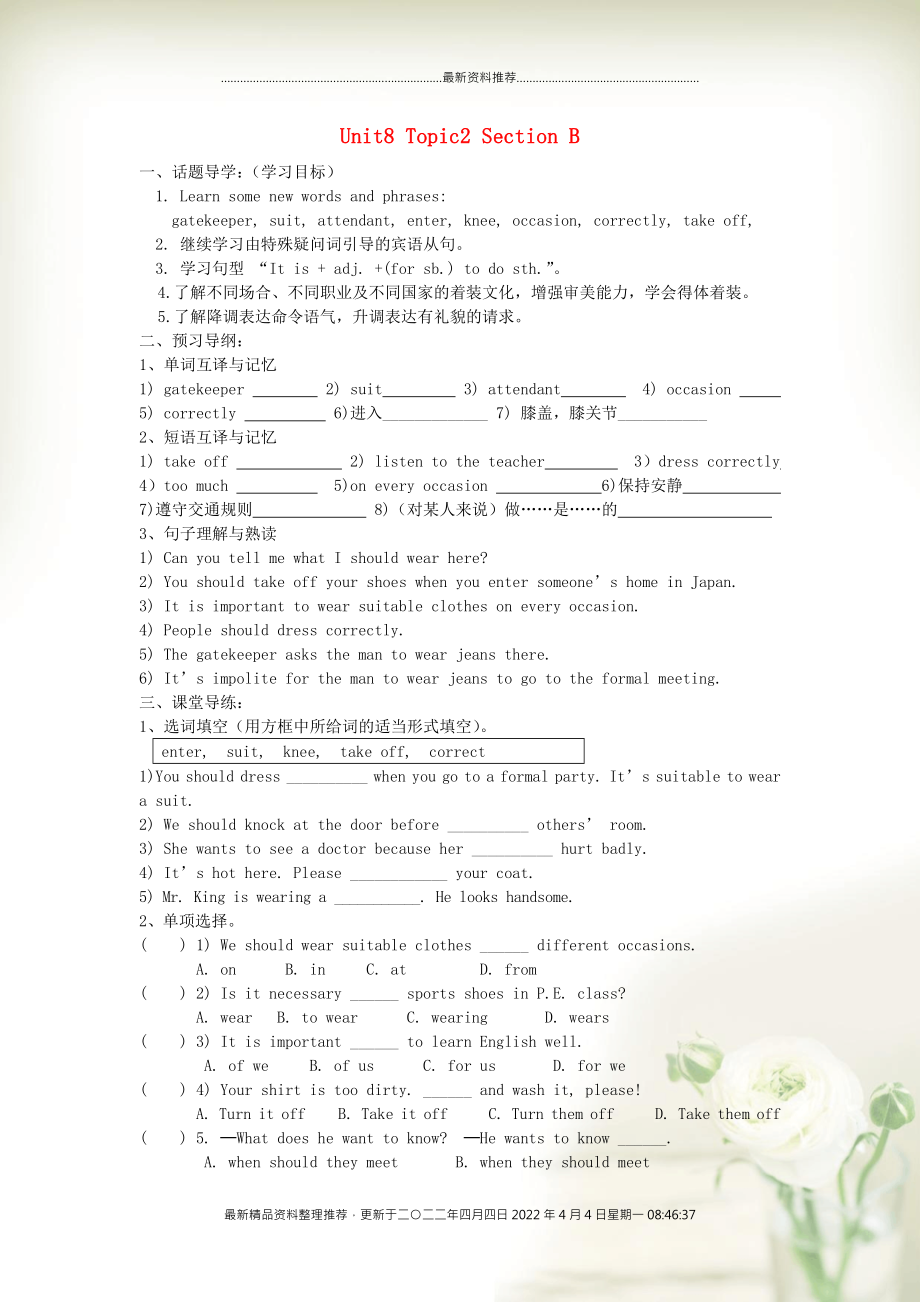《(新新導(dǎo)學(xué)案)廣東省清遠(yuǎn)市八年級(jí)英語(yǔ)下冊(cè) Unit 8 Our Clothes Topic 2 We can design our own uniforms SectionB導(dǎo)學(xué)案 (新版)仁愛(ài)版》由會(huì)員分享�����,可在線閱讀���,更多相關(guān)《(新新導(dǎo)學(xué)案)廣東省清遠(yuǎn)市八年級(jí)英語(yǔ)下冊(cè) Unit 8 Our Clothes Topic 2 We can design our own uniforms SectionB導(dǎo)學(xué)案 (新版)仁愛(ài)版(3頁(yè)珍藏版)》請(qǐng)?jiān)谘b配圖網(wǎng)上搜索。
1�、……………………………………………………………最新資料推薦…………………………………………………
Unit8 Topic2 Section B
一�、話題導(dǎo)學(xué):(學(xué)習(xí)目標(biāo))
1. Learn some new words and phrases:
gatekeeper, suit, attendant, enter, knee, occasion, correctly, take off,
2. 繼續(xù)學(xué)習(xí)由特殊疑問(wèn)詞引導(dǎo)的賓語(yǔ)從句���。
3. 學(xué)習(xí)句型 “It is + adj. +(for sb.) to do sth.”�。
4.了解不同場(chǎng)合�、不同職業(yè)及不同國(guó)家的著裝文化,增
2���、強(qiáng)審美能力�����,學(xué)會(huì)得體著裝����。
5.了解降調(diào)表達(dá)命令語(yǔ)氣��,升調(diào)表達(dá)有禮貌的請(qǐng)求�����。
二�����、預(yù)習(xí)導(dǎo)綱:
1、單詞互譯與記憶
1) gatekeeper 2) suit 3) attendant 4) occasion
5) correctly 6)進(jìn)入_____________ 7) 膝蓋���,膝關(guān)節(jié)___________
2��、短語(yǔ)互譯與記憶
1) take off 2) listen to the teacher 3)dress correctly
3��、
4)too much 5)on every occasion 6)保持安靜
7)遵守交通規(guī)則 8)(對(duì)某人來(lái)說(shuō))做……是……的
3�、句子理解與熟讀
1) Can you tell me what I should wear here?
2) You should take off your shoes when you enter someone’s home in Japan.
3) It is importan
4����、t to wear suitable clothes on every occasion.
4) People should dress correctly.
5) The gatekeeper asks the man to wear jeans there.
6) It’s impolite for the man to wear jeans to go to the formal meeting.
三、課堂導(dǎo)練:
1����、選詞填空(用方框中所給詞的適當(dāng)形式填空)。
enter, suit, knee, take off, correct
1)You should dre
5����、ss __________ when you go to a formal party. It’s suitable to wear a suit.
2) We should knock at the door before __________ others’ room.
3) She wants to see a doctor because her __________ hurt badly.
4) It’s hot here. Please ____________ your coat.
5) Mr. King is wearing a ___________. He look
6、s handsome.
2�、單項(xiàng)選擇�����。
( ) 1) We should wear suitable clothes ______ different occasions.
A. on B. in C. at D. from
( ) 2) Is it necessary ______ sports shoes in P.E. class?
A. wear B. to wear C. wearing D. wears
( ) 3) It is important ______ t
7、o learn English well.
A. of we B. of us C. for us D. for we
( ) 4) Your shirt is too dirty. ______ and wash it, please!
A. Turn it off B. Take it off C. Turn them off D. Take them off
( ) 5. ─What does he want to know? ─He wants to know ______.
8���、 A. when should they meet B. when they should meet
C. they should meet or not D. that they should meet
四�、復(fù)習(xí)自測(cè):
1���、補(bǔ)全對(duì)話(從方框中選擇恰當(dāng)?shù)木渥友a(bǔ)全對(duì)話��,其中有兩項(xiàng)是多于的��。)
A: Excuse me, sir.
B: Yes?
A: 1
B: Why can’t I do that?
A: 2 _Every one here should wear formal clothes.
B: Oh, I s
9��、ee. 3
A: You should wear a business suit.
B: OK. I have prepared a suit in my suitcase(手提箱). 4 I’m afraid I need to change my clothes.
A: 5 _ Thank you very much for your cooperation(合作).
A. This way, please.
B. Because it’s a formal business meeting.
C. Could you tell me what I shoul
10��、d wear here?
D. Which is the way to the meeting room?
E. I’m afraid you can’t wear jeans here.
F. It’s good manners to wear suitable clothes.
G. Where is the changing room, please?
1�����、__________ 2�����、__________ 3����、__________ 4、__________ 5��、__________
2���、根據(jù)漢語(yǔ)意思完成句子����。
1) 對(duì)醫(yī)生來(lái)說(shuō)穿制服上班是很重要的�。
____
11、_________________ that the doctor wear uniforms when they are at work.
2) 你能告訴我他們什么時(shí)候?qū)?huì)去購(gòu)物嗎��?
Could you tell me ______________________ go shopping?
3) 如果你覺(jué)得熱�,可以脫掉外套。
If you feel hot, you can _________________ your coat.
4) 對(duì)于Kate來(lái)說(shuō)搬動(dòng)那個(gè)大箱子是困難的�����。
___________________________ carry the big box.
5)
12�����、在人們應(yīng)該在不同的場(chǎng)合穿恰當(dāng)?shù)囊路?
People should wear suitable clothes ____________________.
五���、課文解讀:
(1) You should take off your shoes when you enter someone’s home in Japan.在日本���,當(dāng)你走進(jìn)別人家時(shí), 應(yīng)該脫鞋����。
take off“脫下(衣物),摘掉”�,其反義詞為put on。如:Why not take off your coat?為什么不把外套脫掉���?
【拓展】take off還有“取下����,去掉��,起飛”等含義��。如:The plane
13���、will take off in two minutes.兩分鐘后飛機(jī)將要起飛��。
(2) It is important to wear suitable clothes on every occasion.在每一個(gè)場(chǎng)合衣著得體是重要的���。
本句型為“It is + adj. +(for sb.) to do sth.”�,it 是形式主語(yǔ)�����,真正的主語(yǔ)是to do sth., 意為“(對(duì)某人來(lái)說(shuō))做……是……的”��?����?梢耘c“It is + adj. + that從句”互換��。如:
It is important for us to take care of the environment.
14����、
=It’s important that we should take care of the environment. 保護(hù)環(huán)境對(duì)我們來(lái)說(shuō)是重要的。
六��、評(píng)價(jià)
內(nèi)容
等級(jí)
自評(píng)
小組長(zhǎng)評(píng)價(jià)
預(yù)習(xí)情況
A
B
C
D
課堂表現(xiàn)
A
B
C
D
小組合作
A
B
C
D
Section B
二�、1、1)門衛(wèi) 2)套裝�����;適合 3)服務(wù)員 4) 時(shí)機(jī) 5) 正確地
6) enter 7) knee
2、1)脫下 2) 聽(tīng)老師講 3)正確著裝 4) 太多 5) 在每一個(gè)場(chǎng)合
6)ke
15�、ep quiet 7) obey the traffic rules
8) It’s + adj. + (for sb.) to do sth.
三、1�、1) correct 2) entering 3) knees 4) take off 5) suit
2���、1)----5) A B C B B
四�����、1���、 E B C G A
2、1) It’s important 2) when they will 3) take off
4) It’s difficult/ hard for Kate to 5) on different occasion
最新精品資料整理推薦��,更新于二〇二二年四月四日2022年4月4日星期一08:46:37
 (新新導(dǎo)學(xué)案)廣東省清遠(yuǎn)市八年級(jí)英語(yǔ)下冊(cè) Unit 8 Our Clothes Topic 2 We can design our own uniforms SectionB導(dǎo)學(xué)案 (新版)仁愛(ài)版
(新新導(dǎo)學(xué)案)廣東省清遠(yuǎn)市八年級(jí)英語(yǔ)下冊(cè) Unit 8 Our Clothes Topic 2 We can design our own uniforms SectionB導(dǎo)學(xué)案 (新版)仁愛(ài)版

